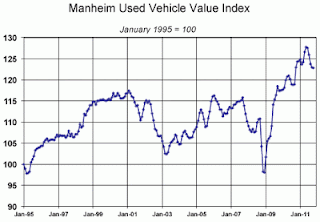I am often asked why used car prices are so high. While they are generally expected to peak in April, used vehicle prices will remain stable for the next several months. In fact, compact and mid-size cars will appreciate in value and outpace other segments because of rising gasoline prices.
Why? Well flash back 33 months to the federal governments "Cash for Clinkers" program. While a boom for new vehicles, that program took 700,000 used vehicles off the road and sent them to the crusher. Those vehicles came from the lower end of the price spectrum and created a shortage in that price range.
At the same time, our country went from a 16 million new vehicle market, to 13.1 million in 2008, 10.5 million in 2009 and 11.2 million in 2010. In those three years, there were 13.2 fewer new vehicle transactions than in prior years.
According to NADA economist Paul Taylor, roughly 55 percent of new-car deals have a trade-in so that means about 7.3 fewer trades plus the 700,000 "clunkers" equals 8 million fewer vehicles in the used car market. If you understand a price curve or supply and demand, you understand that a lower supply means higher prices.
That is why trade-in values are at historically high levels - as much as 35% higher trade-in values for the same car as same-time a year ago. If you have a vehicle to trade, you can expect to get more trade value than in the past. If you have a low mileage or compact or mid-size car, you can expect top dollar in trade. High mileage SUVs have lagged as fuel prices have gone up.
It also means that if you have borrowed money on your vehicle, your equity position (the amount you owe compared to the value of the car) is at a peak as well.
If you typically buy a late-model used vehicle, you may want to consider an new model. The price difference is more than offset by the additional warranty and the fewer miles on the new vehicle.
Manufacturers are taking advantage of the inflated used vehicle prices by offering very lucrative lease deals. Lease payments are driven by the residual value of the leased vehicle (or predicted value of the new vehicle at the end of the lease). The higher the residual value, the lower the monthly lease payment. They are offering short term (24-30 month) leases using a strong residual value to drive lease payments to very, very attractive levels.
Leasing seems to be a bit confusing to people. I like the analogy of only buying a gallon of milk rather than the whole cow. Leasing allows you to pay for only that portion of the vehicle that you use. It also takes some of the risk out of vehicle ownership. You should at least have leasing under consideration.
Almost all new vehicles will offer better fuel economy as well. So regardless of whether you find buying or leasing more attractive for your situation, there has NEVER been a better time to get into a new vehicle.


No comments:
Post a Comment